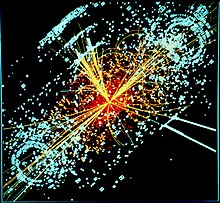
Back Catástrofe del vacío Spanish Konstante kosmologikoaren arazo Basque مسئله ثابت کیهانی Persian Problème de la constante cosmologique French 우주상수 문제 Korean Catástrofe do vácuo Portuguese Проблема космологической постоянной Russian Vakum faciası Turkish 宇宙學常數問題 Chinese
| Beyond the Standard Model |
|---|
 |
| Standard Model |
Unsolved problem in physics:
Why is the vacuum energy density much smaller than a zero-point energy suggested by quantum field theory?
In cosmology, the cosmological constant problem or vacuum catastrophe is the substantial disagreement between the observed values of vacuum energy density (the small value of the cosmological constant) and the much larger theoretical value of zero-point energy suggested by quantum field theory.
Depending on the Planck energy cutoff and other factors, the quantum vacuum energy contribution to the effective cosmological constant is calculated to be between 50 and as many as 120 orders of magnitude greater than observed,[1][2] a state of affairs described by physicists as "the largest discrepancy between theory and experiment in all of science"[1] and "the worst theoretical prediction in the history of physics".[3]
- ^ a b Cite error: The named reference
AdlerCasey1995was invoked but never defined (see the help page). - ^ Bengochea, Gabriel R.; León, Gabriel; Okon, Elias; Sudarsky, Daniel (11 January 2020). "Can the quantum vacuum fluctuations really solve the cosmological constant problem?". The European Physical Journal C. 80 (18): 18. arXiv:1906.05406. Bibcode:2020EPJC...80...18B. doi:10.1140/epjc/s10052-019-7554-1. S2CID 189762342. Retrieved 21 October 2022.
- ^ MP Hobson, GP Efstathiou & AN Lasenby (2006). General Relativity: An introduction for physicists (Reprint ed.). Cambridge University Press. p. 187. ISBN 978-0-521-82951-9.